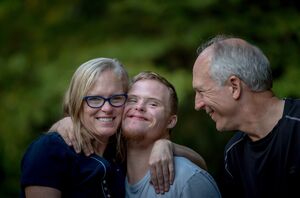Marriage and Family
Marriage Week 2023: Tax shake-up can ease "unfair" financial burden on families

Ministers should reform the UK’s “individualised” tax system to ease the burden on British families, including married couples with children, campaigners say.
CARE notes that existing income tax rules are inherently unfair as they fail to recognise that households with children have much less disposable income.
The charity is calling for a significant shift in Government policy, saying: “Income tax should be based on household income, not individual income”.
The call for reform comes as marriage week 2023 draws to a close in the UK. Ross Hendry, CEO of CARE, comments:
“COVID-19 has faded from the headlines, but our country is facing a new, fiscal pandemic. Across the UK, household bills are high. Families are feeling the strain and facing desperate choices. With reform of income tax rules, Ministers can make a difference.
“The UK tax system fails to treat families fairly. The amount of tax that a family pays in the UK bears little relationship to how well off that household is. Families in poverty are paying income tax. Families in the bottom half of income distribution pay tax at the higher rate.
“This unfairness must be addressed. A shift in Government policy is needed. We recognise that the changes called for will be challenging to enact, but as a society we should always strive for what is fair, even if it’s difficult to achieve.
"As we approach the end of a week when many people in the UK have celebrated marriage, it would be an opportune time for Ministers to announce work on tax changes that would directly benefit married couples, and many other people."
A report by CARE and tax policy consultants Tax & the Family argues that existing rules governing income tax and national insurance contributions are inherently unfair as they fail to recognise that households with children have far less disposable income.
The report states:
"Because income tax and NICs are both based on individual income, the amount of tax paid by families – households with children – bears little relationship to how well off they are. Families in poverty pay income tax, often significant amounts. This problem, long ignored by successive governments and others, should be addressed now.”
“The failure of the income tax system to take account of household size and circumstances results in taxpayers with children paying a lot more tax than taxpayers without children who have the same standard of living, some families with household income below the poverty line paying income tax, and families in the worse off half of the population paying higher rate tax and losing child benefit”.
The UK is out-of-step with other Western nations that recognise the pressures families face. The report adds: “Comparing the UK with individual countries, the UK income tax burden is greater than the figures for France, Germany and the US.”
CARE and Tax & the Family call for a significant “shift in Government policy”, saying: “Income tax should be based on household income, not individual income”. Recognising that such a change cannot be “achieved overnight”, the groups also call for several short-term changes to ease pressure on struggling homes. They recommend that:
- The threshold for the High-Income Child Benefit Charge be increased
- The reintroduction of child tax allowances be explored
- The marriage allowance be increased, widened, and a marginal relief added
- The restriction of child credits to two children in a family be repealed
- Child benefit be increased to restore its value in real terms
ENDS
Read the Report
The Taxation of UK Families 2021 Including International Comparisons
About CARE
Christian Action Research and Education (CARE) provides social policy analysis from a Christian perspective. It has produced an annual report on taxation for 14 years.
About Tax & the Family
Tax & the Family consists of independent consultants Leonard Beighton, Don Draper, and Alistair Pearson. Leonard Beighton spent 37 years in the Inland Revenue, ending in 1994 as Deputy Chairman of the Board. In 2011 he was made an Honorary Fellow of the Chartered Institute of Taxation. Don Draper worked on tax policy in the Inland Revenue for over 20 years before moving to PricewaterhouseCoopers. In retirement he has taken a special interest in the taxation of the family.
ENDS
For more information or to request an interview, contact: press@care.org.uk
Share
